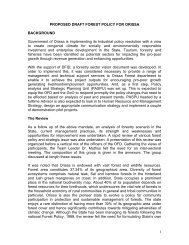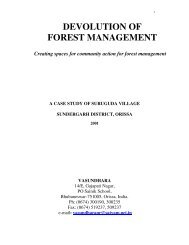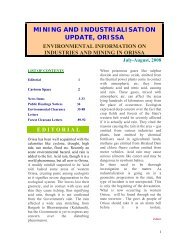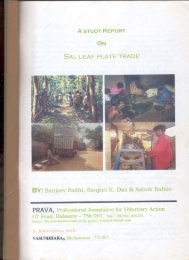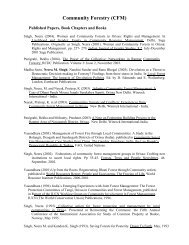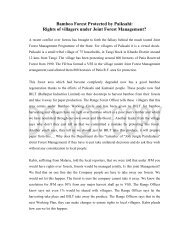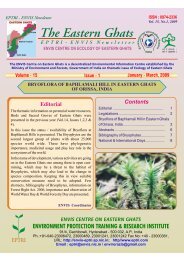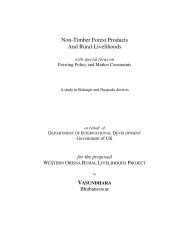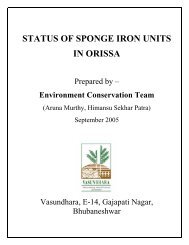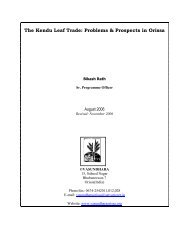Bamboo in Orissa: Trade and Livelihood Perspective - Vasundhara
Bamboo in Orissa: Trade and Livelihood Perspective - Vasundhara
Bamboo in Orissa: Trade and Livelihood Perspective - Vasundhara
Create successful ePaper yourself
Turn your PDF publications into a flip-book with our unique Google optimized e-Paper software.
All rights reserved by VASUNDHARA(www.vasundharaorissa.org). For any clarification, contact author at sunlit1968@yahoo.co.<strong>in</strong><br />
end-user is considerable, middlemen do have a scope though <strong>in</strong> many such cases they do<br />
not actually come <strong>in</strong>to the picture due to a number of reasons (like, lack of regular dem<strong>and</strong>,<br />
negligible scope of profit-mak<strong>in</strong>g, etc.).<br />
The bus<strong>in</strong>ess is carried out sometimes at the doorstep of the artisan <strong>and</strong> sometimes <strong>in</strong> rural<br />
haats <strong>and</strong>/or permanent shops. However, govt agencies like ORMAS <strong>and</strong> DRDA etc. have<br />
facilitated the market<strong>in</strong>g of both traditional <strong>and</strong> non-traditional products through<br />
exhibitions <strong>and</strong> trade fairs. In fact, most of the non-traditional items lack a regular dem<strong>and</strong><br />
<strong>in</strong> the local markets ow<strong>in</strong>g to the absence of their role <strong>in</strong> the traditional socio-cultural<br />
practices, <strong>and</strong> hence exhibitions <strong>and</strong> trade fairs are the only hope for their market<strong>in</strong>g. Such<br />
sophisticated <strong>and</strong> delicate artefacts are usually purchased by the elite people more for<br />
decoration purposes. It is for this reason that artisans can hardly depend on such products<br />
on a regular basis.<br />
Supply <strong>in</strong> lot may <strong>in</strong>volve transportation plus other charges(if any). For <strong>in</strong>stance, for a<br />
bundle(conta<strong>in</strong>s 12 pieces) of bidi peti transportation(for about 17 km distance from<br />
Munder to Sambalpur)) charge is Rs.10 upto the town; then Rs.3 is paid at the check gate,<br />
after which Rs.5 is paid to the rickshaw to reach the bidi factory/godown.<br />
Some products are exported to other states <strong>in</strong> various ways(i.e., either directly or through<br />
petty traders). For example, w<strong>in</strong>nows produced at Nakuda(Damasahi) near Tato(Karanjia)<br />
are transported to Badampahar or Rairangpur where women traders com<strong>in</strong>g from Tata,<br />
Cha<strong>in</strong>basa <strong>and</strong> Mushabani, etc. purchase the same to sell <strong>in</strong> their own areas. Transportation<br />
charge(upto Badampahar/Rairangpur) for a bundle of 60() w<strong>in</strong>nows is about Rs.15 on an<br />
average <strong>and</strong> each w<strong>in</strong>now that costs Rs.8 at Nakuda is sold to the women traders @Rs.8.50<br />
to 9.<br />
The trade <strong>and</strong> market scenario curiously varies from area to area <strong>and</strong> from season to<br />
season. For <strong>in</strong>stance, artisans of Gadagopalpur(near Astaranga) are not much hopeful about<br />
their bus<strong>in</strong>ess unlike their brethrens of Kendrapati(Kakatpur) which is not far away.<br />
Remoteness of the village, product diversity <strong>and</strong> popularity, skill <strong>in</strong> trad<strong>in</strong>g <strong>and</strong> limitations<br />
of local dem<strong>and</strong> are among the factors responsible for situation like this. Seasonality is also<br />
a very important factor. The w<strong>in</strong>now of Nakuda that has an off-season rate of Rs.5/piece<br />
dur<strong>in</strong>g March-April, sells at Rs.8 dur<strong>in</strong>g Kalipuja(November i.e. harvest<strong>in</strong>g season).<br />
Similarly, tata which can fetch a price of Rs.30 to 60 per piece <strong>in</strong> the Astaranga area<br />
dur<strong>in</strong>g marriage season, or festivals like kumar purnima or dwitia osha, is difficult to sell<br />
at Rs.5 dur<strong>in</strong>g the off season. The loss dur<strong>in</strong>g off-seasons is compensated to some extent<br />
dur<strong>in</strong>g periods of good dem<strong>and</strong>.<br />
Follow<strong>in</strong>g table shows the estimated production <strong>and</strong> sale of bamboo & cane products<br />
through registered societies <strong>in</strong> the state, between 1999-2000 to 2001-02, <strong>in</strong> lakh rupees:<br />
81



